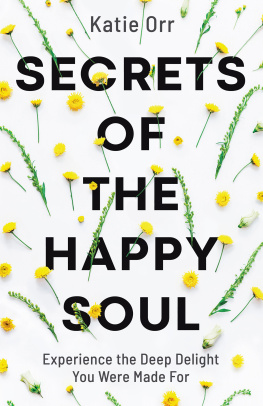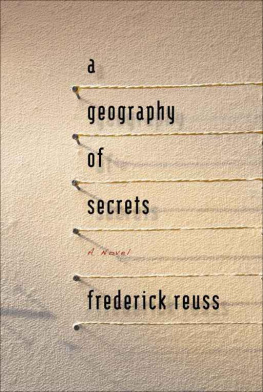Niobe Way - Deep Secrets
Here you can read online Niobe Way - Deep Secrets full text of the book (entire story) in english for free. Download pdf and epub, get meaning, cover and reviews about this ebook. publisher: Harvard University Press, genre: Art. Description of the work, (preface) as well as reviews are available. Best literature library LitArk.com created for fans of good reading and offers a wide selection of genres:
Romance novel
Science fiction
Adventure
Detective
Science
History
Home and family
Prose
Art
Politics
Computer
Non-fiction
Religion
Business
Children
Humor
Choose a favorite category and find really read worthwhile books. Enjoy immersion in the world of imagination, feel the emotions of the characters or learn something new for yourself, make an fascinating discovery.

Deep Secrets: summary, description and annotation
We offer to read an annotation, description, summary or preface (depends on what the author of the book "Deep Secrets" wrote himself). If you haven't found the necessary information about the book — write in the comments, we will try to find it.
Niobe Way: author's other books
Who wrote Deep Secrets? Find out the surname, the name of the author of the book and a list of all author's works by series.
Deep Secrets — read online for free the complete book (whole text) full work
Below is the text of the book, divided by pages. System saving the place of the last page read, allows you to conveniently read the book "Deep Secrets" online for free, without having to search again every time where you left off. Put a bookmark, and you can go to the page where you finished reading at any time.
Font size:
Interval:
Bookmark:
BOYS FRIENDSHIPS
AND THE CRISIS OF CONNECTION
Niobe Way
HARVARD UNIVERSITY PRESS
Cambridge, Massachusetts, and London, England
Copyright 2011 by the President and Fellows of Harvard College
All rights reserved
Printed in the United States of America
First Harvard University Press paperback edition, 2013
Library of Congress Cataloging-in-Publication Data
Way, Niobe
Deep secrets : boys friendships and the crisis of connection / Niobe Way.
p. cm.
Includes bibliographical references and index.
ISBN 978-0-674-04664-1 (cloth : alk. paper)
ISBN 978-0-674-07242-8 (pbk.)
1. Male friendship. 2. Emotions in adolescence. 3. Emotions in children.
I. Title.
BF575.F66W39 2011
155.5'32dc22 2010047702
To Raphael, Justin, and Lucan
my home boys
What we think about ourselves and our possibilities determines what we aspire to become.
Robert Frank, American economist
CONTENTS
It is the middle of June and the New York City heat is on full blast, making it even hotter in the empty high school classroom where 15-year-old Justin and his interviewer Jos sit in the late afternoon. Justin, whose mother is Puerto Rican and whose father is Irish and Italian American, is being interviewed for my school-based research project on boys social and emotional development. There is neither an air conditioner nor a fan in the classroom, so Justin, in his baggy jeans and t-shirt, pulls out a notebook from his backpack and starts to fan himself as he listens to Jos begin the interview protocol. This meeting is the second of four annual interviews. The first set of questions is about Justins friends in general. He responds by discussing his network of peers in school. Turning to the topic of close friendships, he says:
[My best friend and I] love each other... thats it... you have this thing that is deep, so deep, its within you, you cant explain it. Its just a thing that you know that that person is that person... and that is all that should be important in our friendship... I guess in life, sometimes two people can really, really understand each other and really have a trust, respect, and love for each other. It just happens, its human nature.
boys speak about their male friends with abandon, referring to them as people whom they love and to their feelings as, to put it in Justins words, this thing that is deep, so deep, its within you, you cant explain it. They talk in great detail and with tremendous affect about their best friends, with whom they share their deepest secrets and without whom they would, according to 15-year-old Malcolm, feel lost.
Boys also underscore how important the sharing of thoughts and feelings is in these friendships for their psychological wellbeing. George at 16 years old says that close friends are important because, I mean, if you just have your mother and your parents [to talk to], then youre just gonna have all these ideas bottled up and youre just gonna go wacko because you cant express yourself even more. Chen at 15 years old says that he needs a close friend so you have someone to talk to, like you have problems with something, you go talk to him. You know, if you keep it all the stuff to yourself, you go crazy. Try to take it out on someone else. Kai says bluntly at the age of 14: you need a friend or else, you would be depressed, you wont be happy, you would try to kill yourself, cause then youll be all alone and no one to talk to.
Set against a culture that perceives boys and men to be activity oriented, emotionally illiterate, and interested only in independence, these responses seem shocking. The image of the lone cowboy, the cultural icon of masculinity and the symbol of independence and thus of maturity in the West, suggests that what boys want and need most are opportunities for competition and autonomy. Yet the vast majority of the hundreds of boys whom my research team and I have interviewed from early to late adolescence suggest that their closest friendships share the plot of Love Story more than the plot of Lord of the Flies. Boys valued their male friendships greatly and saw them as essential components to their health, not because their friends were worthy opponents in the competition for manhood but because they were able to share their thoughts and feelingstheir deepest secretswith these friends.
F. G. Bonser, a psychologist working at the beginning of the twentieth century, called intimate friendships the most potent in the development of man as a member of society. Yet looking at the vast quantity of articles and books on boys, adolescence, and human development, one rarely sees a discussion of these intimate relationships. Reflecting a culture that values romantic relationships more than friendships and in which only females are thought to desire intimate friendships and have feelings more generally, the current scholarship on boys, friendships, and adolescence misses a major theme. Scholars pay almost no attention to what Justin describes with such love and affection and what has been considered critical for healthy development for over a century: emotionally intimate male friendships.
When male friendships are discussed in scholarly or popular literature, they are often relegated to the superficial category of buddies and described as loose collections that offer very little sharing or emotional support. male friendships, and the stereotype that boys are only interested in one thing is perpetuated.
When I began writing this book, friends and colleagues remarked, somewhat smugly, that it would be a short book as there is not much to say when it comes to boys friendships. While some were willing to admit that friendships such as Justins are possible, and most remembered having had them when they were younger, they thought they were rare among teenage boys, whothey were quick to point outmostly have sex or sports on the brain. Kenneth Rubin a developmental psychologist who studies childrens friendships, writes:
Girls interactions satisfy social or communal needs or focus on achieving closeness and connection through the sharing of thoughts, emotions, and understanding. Girls, in other words, like to talk about their happy times, and their miseries about the people they know and their feelings about them.... Boys interactions conversely serve to promote and solidify individualist or agentic needs for action, control, excitement, personal achievement or one-upmanship and so on. Boys tend to come together in competitive hierarchies, each determined through participating in activities that challenge the individual to prove his mettle in comparison to his peers.
He adds that teenage boys, in particular, may find it easier to be on intimate terms with their parents than with their closest buddy given the lack of comfort most boys feel when it comes to intimacy. Our hyper masculine American culturea culture in which heterosexual men do not hold hands and boys do not share beds unless they are from the same familyframes boys and men as unable to have and thus as uninterested in having intimate male friendships.
Even the fundamental capacity for males to have rich and emotionally satisfying lives is questioned by scholars. Psychologist Stephen Frosh summarizes this view: Boys (and men) are [perceived as] emotionally inarticulate, lacking the capacity to name and therefore even to experience feelings and emotions, and particularly to engage in sustained and reflective conversation about their feelings for and relationships with others. In their best-selling book Raising Cain, the authors conclude:
The majority of boys are not prepared to manage the complexities of a loving relationship because theyve been shortchanged on the basic skills of emotional literacy: empathy, conscience, the vocabulary for meaningful emotional expression, and the idea that emotional interdependence is an assetnot a liability.
Font size:
Interval:
Bookmark:
Similar books «Deep Secrets»
Look at similar books to Deep Secrets. We have selected literature similar in name and meaning in the hope of providing readers with more options to find new, interesting, not yet read works.
Discussion, reviews of the book Deep Secrets and just readers' own opinions. Leave your comments, write what you think about the work, its meaning or the main characters. Specify what exactly you liked and what you didn't like, and why you think so.









